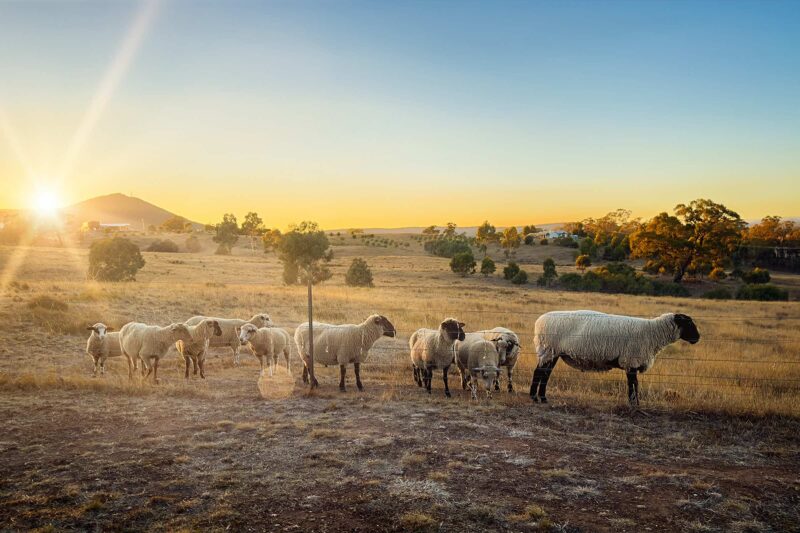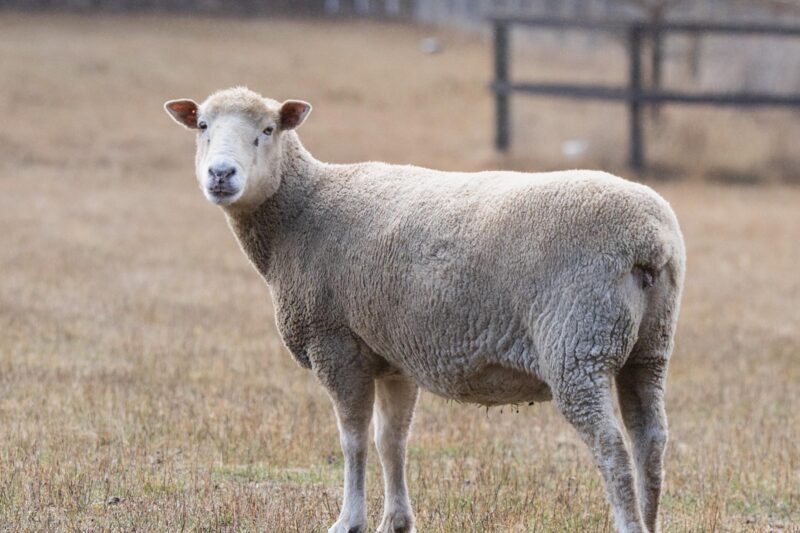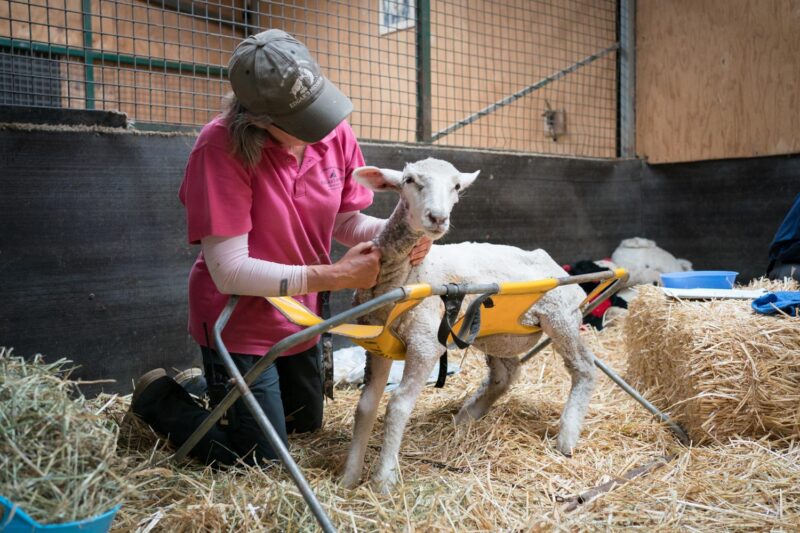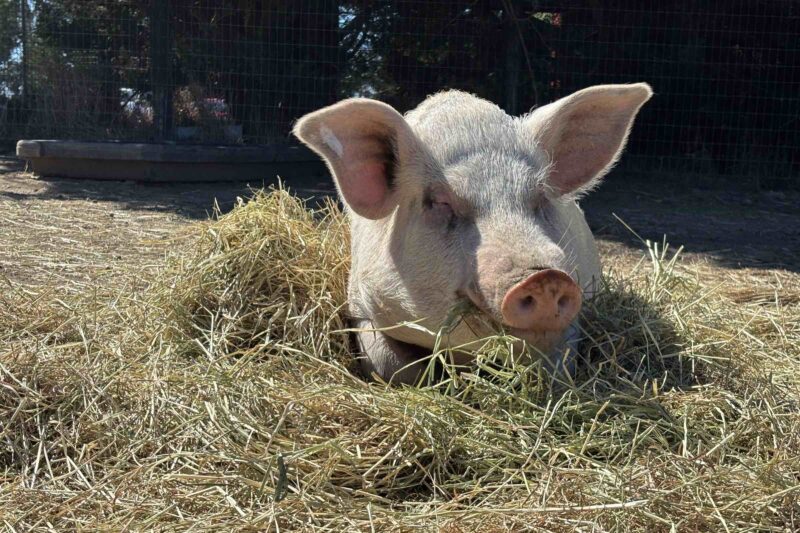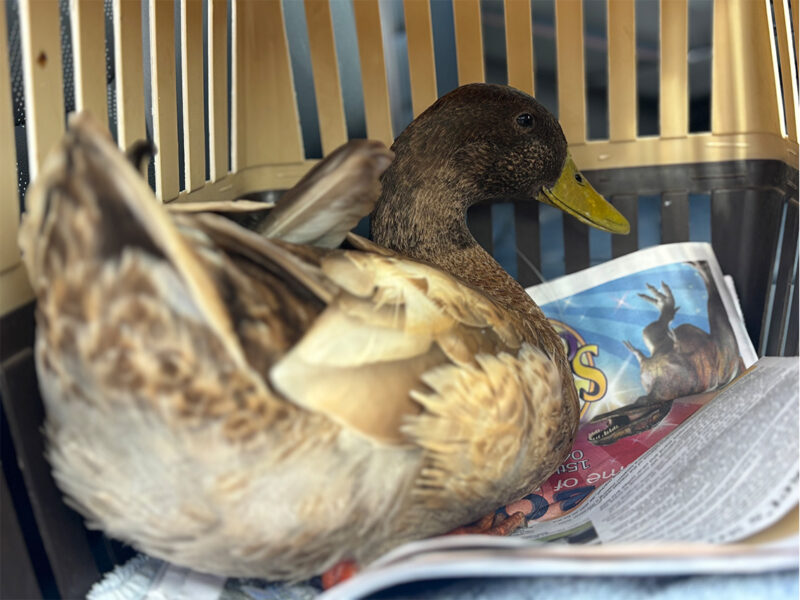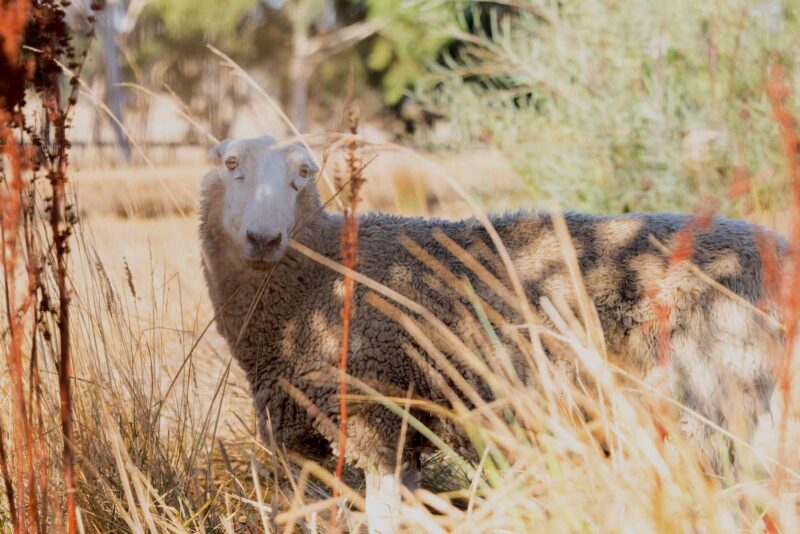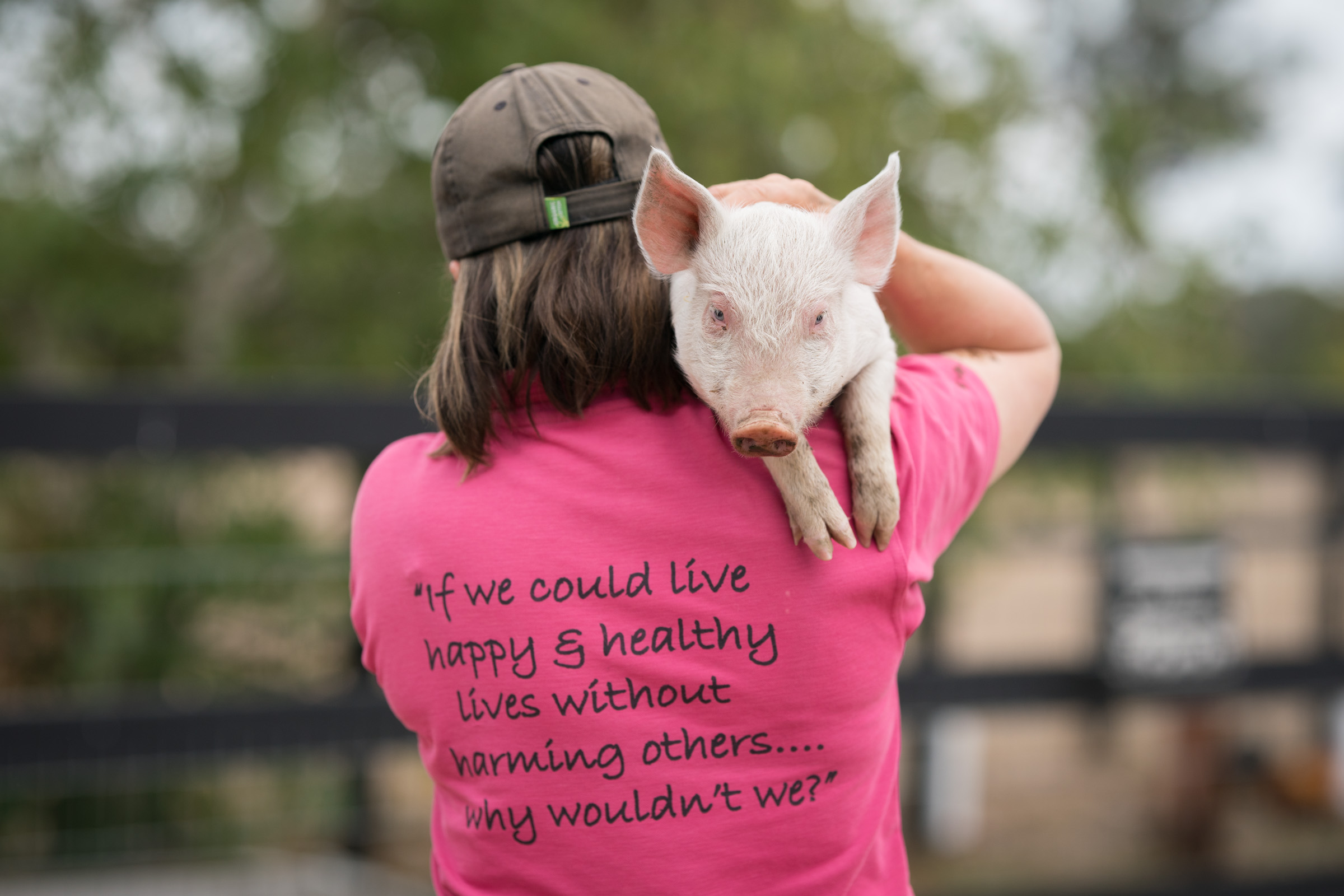
Perhaps…
For a wool-burdened and emaciated sheep, too weak to rise, a sheep whose overgrown-by-many-a-year fleece covered his eyes so he could not see, whose flesh was penetrated by the steely barbs of grass seeds – perhaps it may seem odd to have the word lucky associated with him.
But Alex was lucky. Because he was in the lucky country – Australia. And he was found by a kind-hearted bush walker who, although they could just as easily have walked on, did not. Their kind heart drove a personal obligation to help another being in need.
And for Alex, the rest, as they say, is an awesome history that saw him land at not only a sanctuary, but so too in the hearts of people around the globe who got to know him.
So in case you missed his story, let me tell you a little bit about Alex. When I first met him on Mt Alexander late one evening in March, my heart sank. His condition was appalling, but as I was soon to learn, his spirit was anything but.
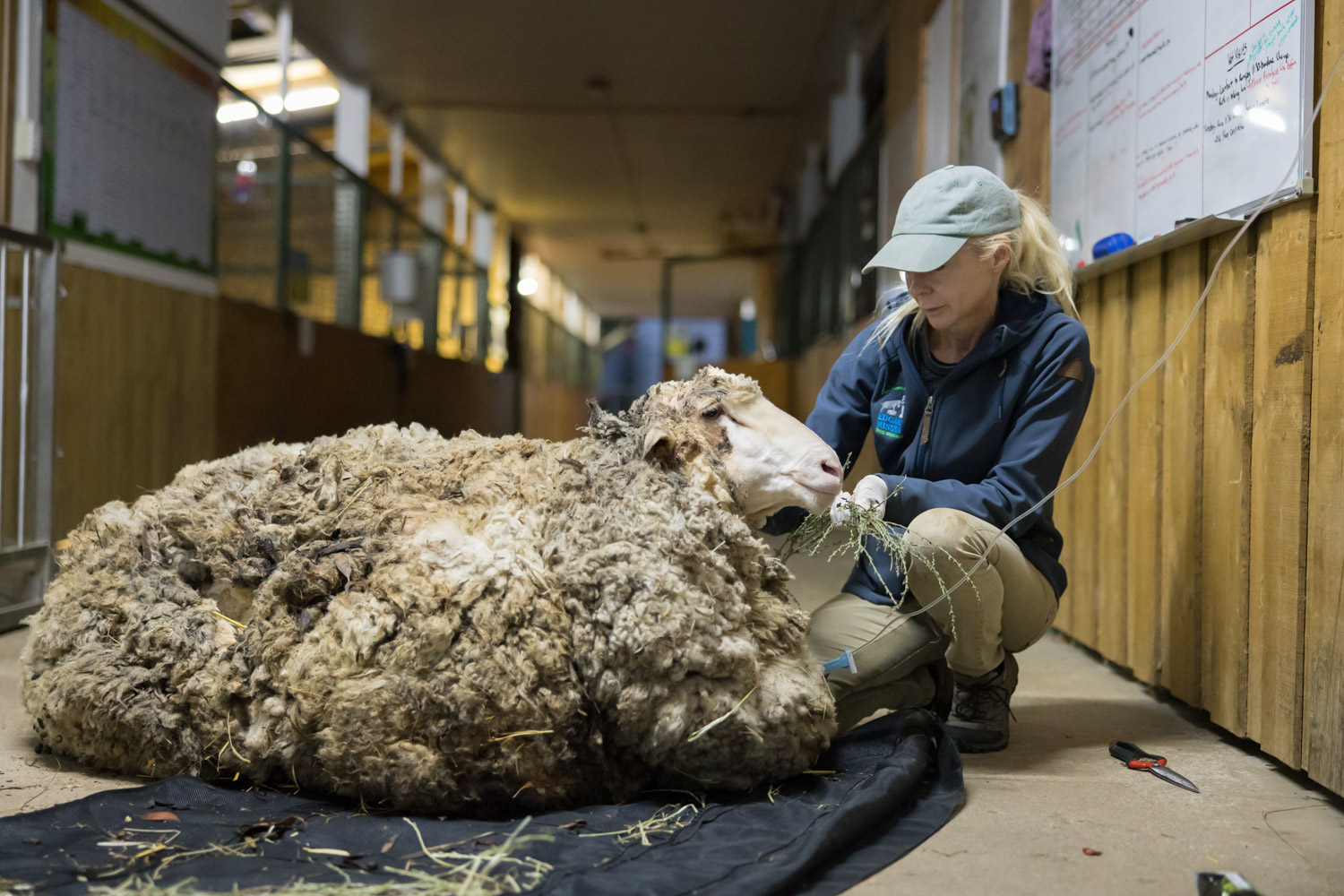
As we journeyed home, I rode with him, a drip line feeding fluids into his dehydrated body whilst his head hung despondently low. And then in an instant it rose. His gaze engaged mine as his eyes changed from despair to very much alive. And in that same instant I knew beyond a doubt he would remain so.
Once relieved of that oppressive 40 kg fleece, we fully saw the “scared and confused about his new circumstance” Alex. Gently ushering him into a stall, Alex began to take his lead from his new buddies Chloe and Molly Brown – two long-term rescued sheep who live at Edgar’s Mission.
You see sheep, just like we humans, need and seek the company of their own, more so in times of trouble. Whilst the calming influence of Chloe and Molly Brown can never be overstated, so too were our soft tones and steady movements around our new friend.
And just like we humans, as Alex felt the comfort of his new surroundings, he began to relax and became more curious. Science informs that animals – and remember we are animals too – are more willing and confident to explore and move about when not fearful, stressed, or ill.
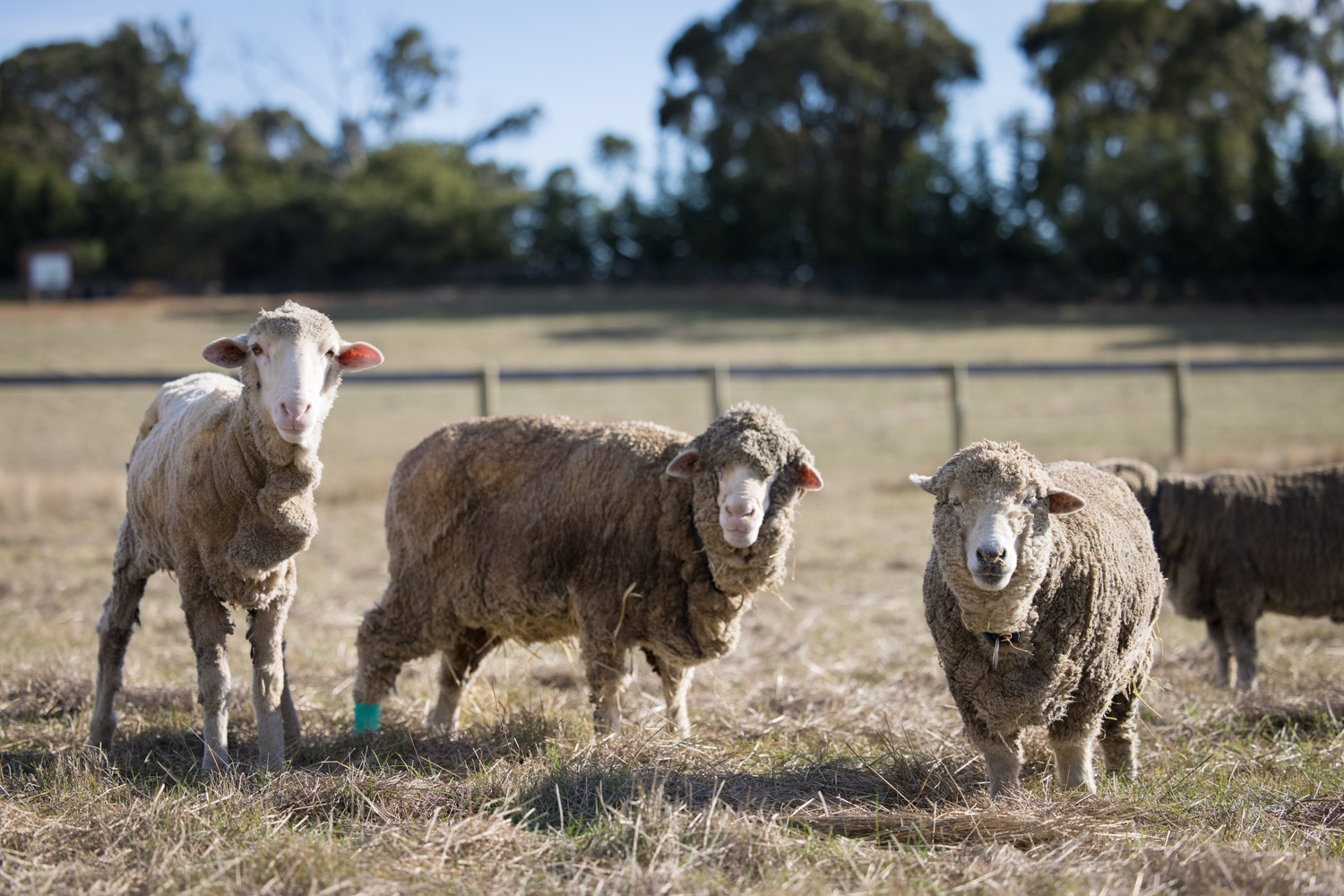
Seeking to survey this new world with his fuzzy muzzle and his brave heart was Alex. Now in a place where he can take ownership of his life, the gentle soul is becoming all he was ever meant to be, a sensitive and sentient being who simply wants his place in the sun.
The same sun we all stand under, breathing the same air that fuels our lungs, the same water reviving our systems. In coming to know animals as I have been fortunate to do, I can readily attest that there is more that unites us than divides us.
And so, I do think it fair to say that Alex was lucky that he got lost. Lost in the lucky country he was found.
For had he not, he could well have fulfilled the destiny of so many of his brethren and that would be for his life to have been extinguished at the blood-stained and unscrupulous hands of the live export industry. Either on-board a cargo vessel that turns into an oven in the heat of the Middle Eastern summer, or on a far-off land with little-to-no animal protection laws or kind-hearted bushwalkers to save him.
The only hope those hapless animals have is us. Just like the bushwalker, just like the courageous naval officer and whistle blower Fazal Ullah, and just like intrepid investigators who venture in hellholes on earth to capture footage of both legal and illegal heinous acts of animal cruelty, it is up to us to heed a personal obligation to bring to the light of day and ear of every politician that enough is enough. No ban, no vote, get the animals off the boat!
As the founder of Edgar’s Mission, a not-for-profit beacon of hope for formerly farmed animals, I know that one of the greatest drivers for change for these animals comes from people getting to know them. And connecting with them. Facilitating this has become my mission.
People often ask me, “so what are really sheep like?” to which I respond, “well, it depends on who I am telling you about for they are all so different. Their personalities are as rich and diverse as the ones you would find within our species. Although not with so many nasties”.
Our relationship with sheep began in the Fertile Crescent over 8,000 years ago, although it would be several thousand more years before they were selectively bred for their fleece. Their domestication, along with that of several other species of animals and plants that humans at the time deemed useful, was to become a crucial step in history. Theirs and ours. It was a time when we humans shifted from co-inhabitants on this planet to a species that sought dominion over others, unlike anything the earth had seen before. With our interests always trumping theirs.
Amidst the sadness that surrounds us today, I want to remind you of hope. Something that sits as close as the human heart, for this is where the greatness of our humanity can be found.
This feeds into my next story of another sheep. It began when a two-day old lamb fell through the cracks of a fast-moving truck on a major highway. Suffering multiple breaks to both of his front legs, a fracture to his wee skull, a critical injury to his left eye that threatened to claim it – I am so pleased to report it did not – and many contusions to his infant body, little Constable Sam, as he has been affectionately named, was bundled up by highway patrol officers. He was then taken back to the station, from where I would collect him some hours later.
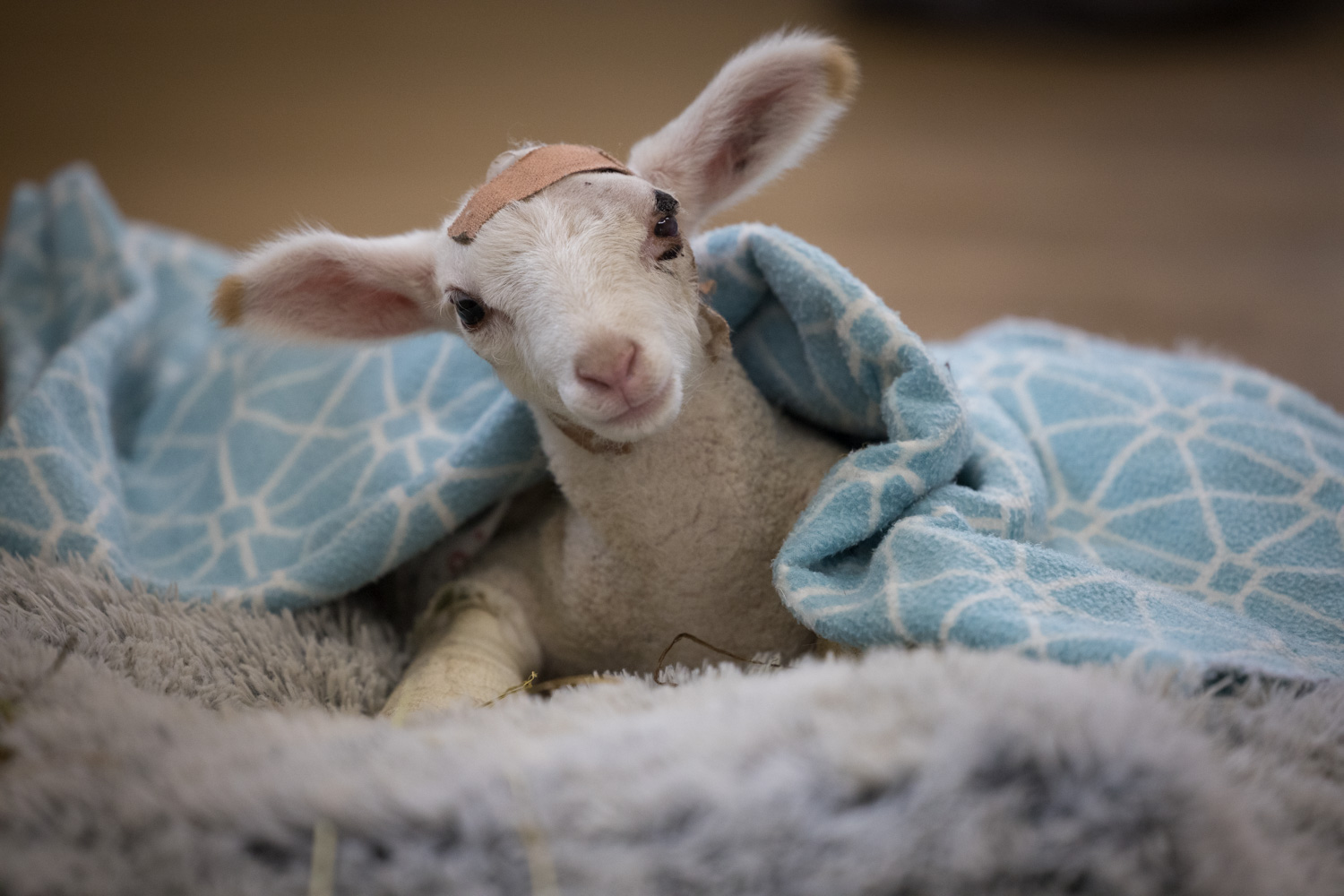
But not before he had apprehended their hearts.
It was quite clear when I arrived that Constable Sam was wrapped in more than a blanket. For he was wrapped in the collective care and love of all the officers there. I saw it on their faces and heard it in their words. A care that saw them want to protect him from harm and ensure only a good outcome would be forthcoming for him. One where he would find sanctuary. A place for his wounds to heal and his little broken heart to mend.
Through sharing dear Constable Sam’s journey on social media, just like that of dear Alex, countless people around the globe have had a chance to get to know him too. To know that he is a cheeky little fellow with a fondness for human affection, a great love of his bottle and going for rides in the car. He wags his tail in delight much like a dog and is cheeky to boot, much like a small child. And as a result, I have yet again had to lamb-proof the little cabin where I live.
In my getting to know Constable Sam, I have come to know many things about him. One being he is a fast learner and has quickly worked out where that little cabin is. That knocking on its door with his hoof will cause the human inside to stop whatever they are doing and let him in. Which he has determined is a great place to be on a cold and rainy day.
Another thing I can tell you about Constable Sam is that he has shown preferences in many things, none more so than in what he likes to eat. However, for him, everything qualifies for an initial taste test and apparently tofu cat litter tastes awesome.
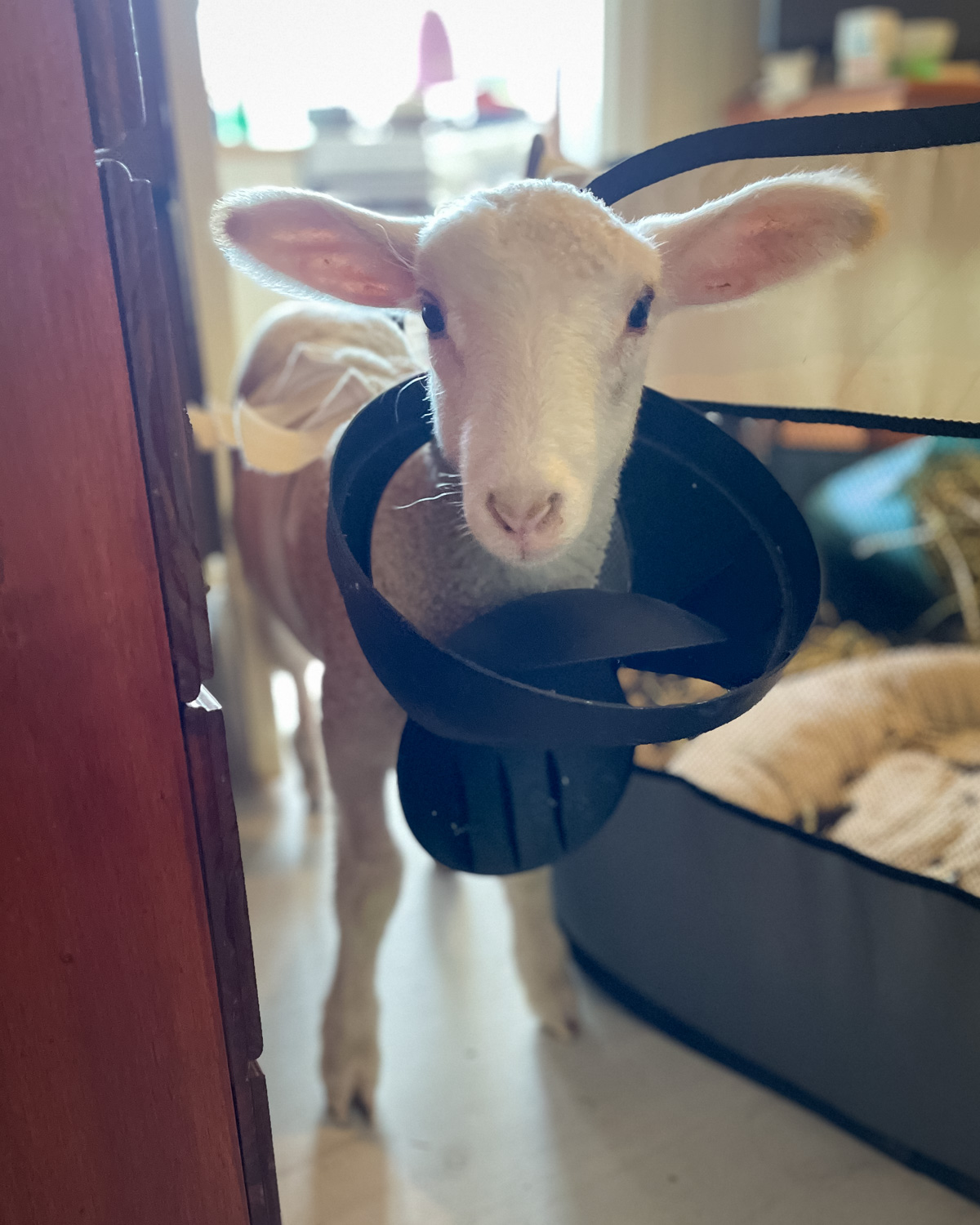
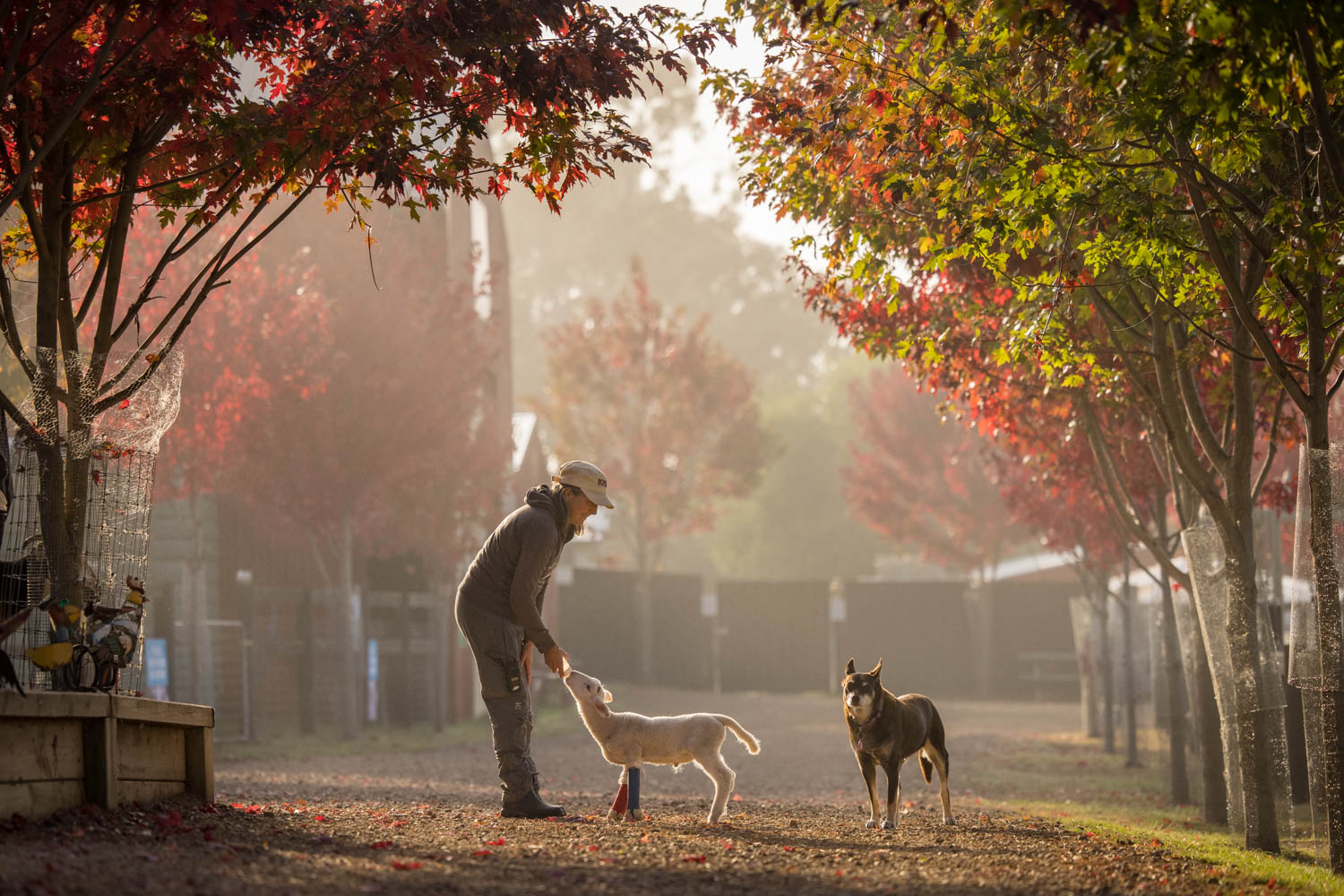
He’s a quirky little guy too, who rather likes to steal Ruby the dog’s bed, that is when he is not stealing a heart. He has a penchant for getting his head stuck in my kitchen tidy bin and never fails to bring a smile to my face when he trots into the office nonchalantly wearing the lid as a scarf with a look as if to say, “honestly, I have no idea how it got there”.
But the most important thing you need to know about Constable Sam is that when he fell through a crack of that fast-moving truck, it actually saved his life. For had he not, he could well have fallen through one of the many cracks in our animal protection legislation that down the track could have seen him crammed into a live export vessel destined for a far-off land with customs, and a climate far different from the land on which he was born.
Make no mistake, atrocities can and do happen here in this lucky country. There is no doubt about it. However, at the very least, here we can do something about it. History and unimaginable animal pain and suffering show that in far-off lands we cannot.
ESCAS, the Exporter Supply Chain Assurance System, has been shown to be wanting, industry has repeatedly failed to police itself, and so too successive governments have failed to bring to bear meaningful change for Australian animals on whose currency of misery and death the industry is based.
Beyond stopping those ships that sail under the radar of human kindness, we can send the strongest message to those importing countries with weak or non-existent animal protection laws, and even to those in this country. And that we as a people and a nation will not accept the unmitigated cruelty towards innocent animals that is inherent in the live export trade.
Moreover, the cessation of the trade will provide local animal protection groups in those other countries with a much-needed opportunity to highlight the unacceptable nature of such ingrained and unquestioned animal suffering.
In peeling back the many layers that has seen cruel animal industries flourish, we find true human vulnerability at its most raw. Here, eyes and hearts have shut down, for this is the only way one can perpetrate and bear witness to the suffering of other animals, both human and non-human, who just like us cherish their life and want to live.
Many of us know all too well the enormous toll this all takes on animals. What is not so readily known is that humans do not escape this unscathed as well. Of recent times we are learning of the psychological impact that even witnessing trauma to animals has on those involved, in addition to the infliction and causation of that harm, violence and death to hapless animals.
And whilst it takes courage to change, so too it takes kindness. For shame, derision and harsh words will never build a bridge of meaningful dialogue or respectful engagement. They will never offer a path to move forward. Only kindness will. When shame and blame and their toxic side-effects take hold, no one wins, especially not the animals.
Gandhi’s belief in the goodness of the human heart is something I too share. I see it every day in what some may describe as unlikely heroes. The kindly bushwalker, the small child who stops to pick up an injured butterfly, the tough biker who ushers an elderly community member across the road, the one-time slaughterhouse worker who becomes a crusader for animals, the animal production farmer who decides to grow kale, the countless volunteers who make good their time helping others.
In closing I would like to circle back to dear Alex. Whilst it was relatively easy to remove the blinders his wool had caused that prevented him from seeing clearly, a far greater challenge exists to remove the blinders that have been handed down from generation to generation. Something that has prevented much-needed change in the way our society views the least heard and the most vulnerable amongst us.
What is needed right now to right this terrible human wrong is our compassion. To allow our compassion to guide us in the dismantling of iniquitous industries, to create conversations, and find solutions that will pave the way for a kinder, more humane, and just way of living.
Every day now we are seeing more and more investments in plant-based foods, in activities that rewild much of our rural landscape that has been cleared either for animal farming or growing crops to feed to them, and the growing of different pulses and ancient grains offer enormous avenues for farmers to diversify their practices – here is where our future lies.
A kinder future calls now to governments to assist and support the growth of these industries. This will allow farmers to still hold connections with the land but to transition to systems of food production that are more in sync with hearts, minds, and nature.
On a personal level we too cannot be idle. Taking action by ensuring our choices align with our belief in a non-violent world. For this can be the greatest legacy we can leave on this planet.
Perhaps now truly is the time to fulfil that personal obligation to leave the world better for our being. To ensure our lucky country extends beyond these shores. To not contribute to suffering wherever we know it to be, be the victim animal, human or the planet.
We should not fear going down this path of change. What we should fear is if we do not.
And there is no better place for this to start than to end the live export industry once and for all, for this is an idea whose time has surely come.
No ban no vote, get the animals off the boat!
